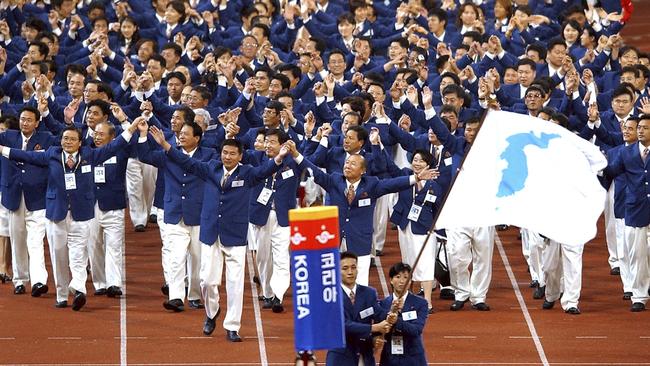Shadow of war over Korean peninsula lifted only temporarily
The dark shadow over the Korean peninsula — and the wider world — is only being lifted temporarily.

The Winter Olympic Games sometimes struggle to gain traction among Australians, few of whom have much experience of the sports, and coming as the Games usually do in the wake of cricket Tests and the Australian Open tennis.
Next month will be different.
For these Olympics will bear the stamp of North Korea’s “Supreme Leader” Kim Jong-un, the most glamorously malevolent figure in today’s pantheon of dictators. They will attract huge global attention.
North and South Korea — who have in the past dozen days rushed into a heady detente — have announced they will form their first unified Korean team, including a joint women’s ice hockey squad. Furthermore, their athletes will parade together at the opening ceremony, as they did to acclaim at the glorious Summer Olympics in Sydney in 2000, and will as then march behind a blue and white “unification” flag.
The bitterly opposed countries have never competed together at an Olympics since the 1950-53 Korean War in which almost three million people died, and which remains subject to a truce but not a formal peace treaty.
The North Korean delegation to attend the PyeongChang Games in the northwest of South Korea from February 9 to 25 will include a 230-member cheer squad, a 30-member taekwondo demonstration team, the 140-person Samjiyon orchestra and probably also the 10-woman pop group Moranbong Band.
The most prominent North Korean athletes to participate will be figure skating pair Ryom Tae-ok and Kim Ju-sik. They will perform their key routine to The Beatles’ A Day In the Life in which John Lennon sings enigmatically: “I read the news today, oh boy/About a lucky man who made the grade/And though the news was rather sad/Well I just had to laugh …”
Before the Olympics, the two Koreas will stage a joint cultural event at Diamond Mountain, a famous beauty spot in the North.
The North will send a delegation of 150 officials and athletes to the Paralympics in March.
Yet it’s only a few weeks since North Korea was persistently threatening to rain death and destruction on the US primarily, but also on Japan and the South.
What’s happening here?
It remains the case that Pyongyang’s motivations are ultimately hidden.
Kim’s core goal is survival; personal survival as a priority, then that of the communist dynasty of which he is the third ruler.
It is possible that he has become sufficiently confident in North Korea’s nuclear capabilities, following a year of incessant testing, that he now feels invulnerable and can afford to show his happy face.
He may also have been driven to an accommodation with Seoul by the tightening of the UN sanctions, making life increasingly difficult for the regime, and perhaps also by the uncertainties surrounding US President Donald Trump’s continuing military threats. One certain factor is that he now has, in South Korea’s President of seven months, Moon Jae-in, a neighbour who favours negotiations.
Moon and Kim have together engineered a detente that looks very much like the proposal of China and Russia; that the North suspends further testing while the South and the US suspend further military exercises.
A further factor doubtless playing in Kim’s mind is the prospect of engineering a split within the countries primarily confronting North Korea. Although Moon has insisted that he maintains full confidence in the US alliance, the main success of Trump’s visit to the region last November comprised his efforts to keep those countries on the same page.
Kim meanwhile wants to turn the North Korea issue into a US issue. It’s going to be intriguing to see how or whether, during the colour, the movement and the emotions of the Olympics, the rest of the region resists Kim’s efforts to divert attention from his own cruel regime and its obsessive nuclearisation.
These Winter Olympics will now be held in far better circumstances than seemed likely.
Talking is a start. Shared activities like a joint Games team takes that a step further. However, the dark shadow over the region — and the wider world — is only being lifted temporarily. Agreement on core life-and-death issues remains a large step away.




To join the conversation, please log in. Don't have an account? Register
Join the conversation, you are commenting as Logout